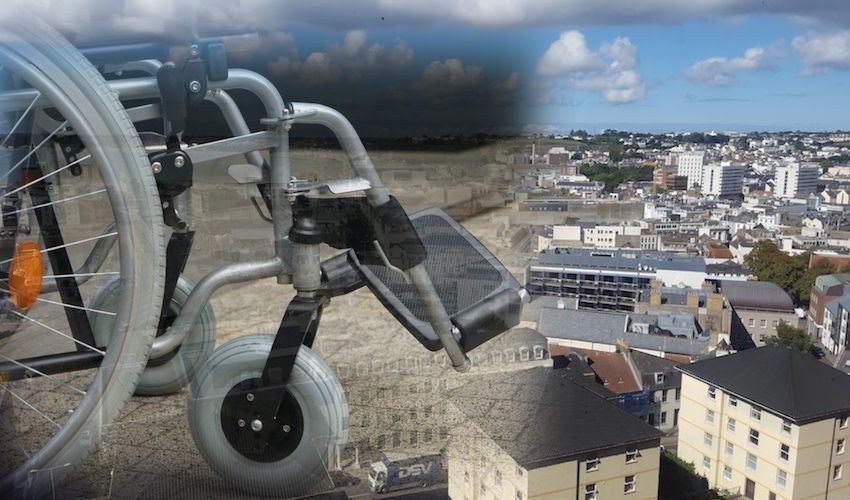


A review of all government buildings to ensure they’re accessible for islanders with disabilities was postponed because the department in charge didn't have enough money to carry it out - despite the law changing later this year.
It emerged during a recent Scrutiny hearing that the delayed work is now underway, a year after its completion was promised.
Grilled on project progress by a panel of politicians tasked with reviewing government spending, the Interim Director of Jersey Property Holdings (JPH), Tim Daniels, accepted that the department does "not have enough money to make universal access” in all government buildings, and that a review is therefore now being carried out to decide which should make the cut.

Pictured: The new legislation aims to make all aspects of Jersey life more accessible, regardless of ability.
The accessibility overhaul was prompted by the new Disability Discrimination Law which means owners of publicly accessible properties will be expected to make “reasonable adjustments” to make them easily useable for those with physical or mental disabilities by 1 September this year.
The former director of JPH, Ray Foster, predicted that this would be a challenge for the department and that the cost of being compliant could reach “£10million plus”.
Then, just months later, it was found that government officials had failed to review the condition of the 500-plus properties in their portfolio for nearly a decade, pushing the estimated bill for dealing with 'backlog' of maintenance alone to over £20million.
Mr Foster's successor, Mr Daniels, has now confirmed these difficulties, revealing that – nine months ahead of the deadline – the audit is not yet complete due to a lack of resources.
During the recent Public Accounts Committee hearing, scrutineer Deputy Inna Gardiner asked Mr Daniels: “Your department pledged over a year ago to undertake an audit of the public property portfolio to assess its suitability in relation to the forthcoming legislation. The initial assessment of a sample of public buildings indicates here that a significant investment potentially running into some millions of pounds over a period of time will be required to implement improvements… Where is it now?”

Pictured: Deputy Inna Gardiner asked questions about the progress of the disability audit at the committee hearing.
Mr Daniels replied: “There is money that has been put into the Government Plan to effect the changes that are required, but what we are doing is having a re-look at the premises that we have currently got to determine exactly where the focus should be.
“The challenge would be that we do not have enough money to make universal access in all of our properties. We are going through a prioritisation process with disability bodies, charities and the like to make sure that we can get a workable solution that will then get proposed to the Minister to approve expenditure, so that we can provide to the best of our endeavours the access that the law requires.”
When asked to confirm if the accessibility audit of the States’ £1billion property portfolio has been finished, Mr Daniels admitted: “No, not yet”.
Pressed on why it had not been finished, Mr Daniels went on to explain: “...There were not any resources last year, the money has been made available this year.”
He also confirmed that the “review of the audit has just started” and that he “hope[s] it will not be more than a month” before it is complete.
Elsewhere in the hearing, independent member of the Public Accounts Committee Adrian Lane asked how the government is managing the risk of not complying with the new Disability Discrimination legislation.

Pictured: It emerged at the hearing that progress on the buildings audit had been pushed back.
Mr Daniels responded: “The DDA [Disability Discrimination Act] requires it to show reasonable endeavours to achieve the measures required by the Accessibility Act… Once the prioritised list of actions is presented for approval, there will be, effectively, a register of companies to show what efforts have been made, what endeavours have been undertaken to provide access, whether it be visual, audible or meeting mental requirements and that those risks will be logged and acknowledged.”
In response to a written question from Deputy Gardiner, the Minister for Infrastructure Deputy Kevin Lewis shed more light on the 'reasonableness' test.
“Many publicly owned or leased buildings are fully accessible already but the States also owns a wide variety of historic buildings, including the States building itself which may be less accessible. An audit is already underway to determine the extra work that is needed and funds have been allocated in the 2020 government plan to meet the costs of the work," he stated.
“An example might be that it would not be reasonable to put a lift in or afford disabled access to the public gallery here (the states building), a listed Victorian building, but it will be perfectly possible to create a room with an accessible visual and audible feed on the ground floor with access from outside.”
Comments
Comments on this story express the views of the commentator only, not Bailiwick Publishing. We are unable to guarantee the accuracy of any of those comments.